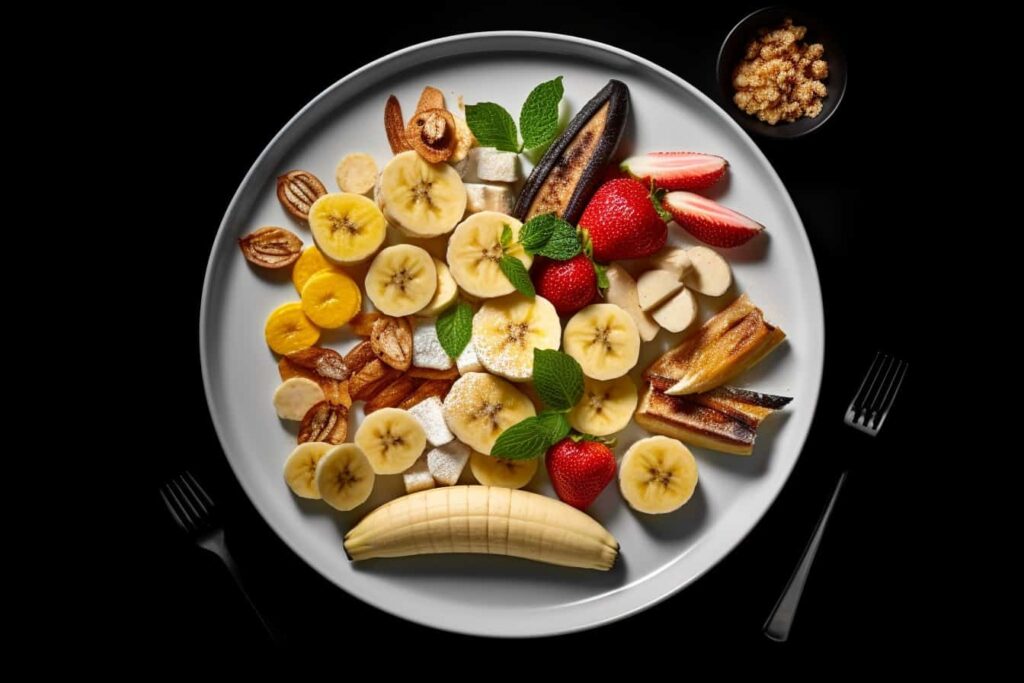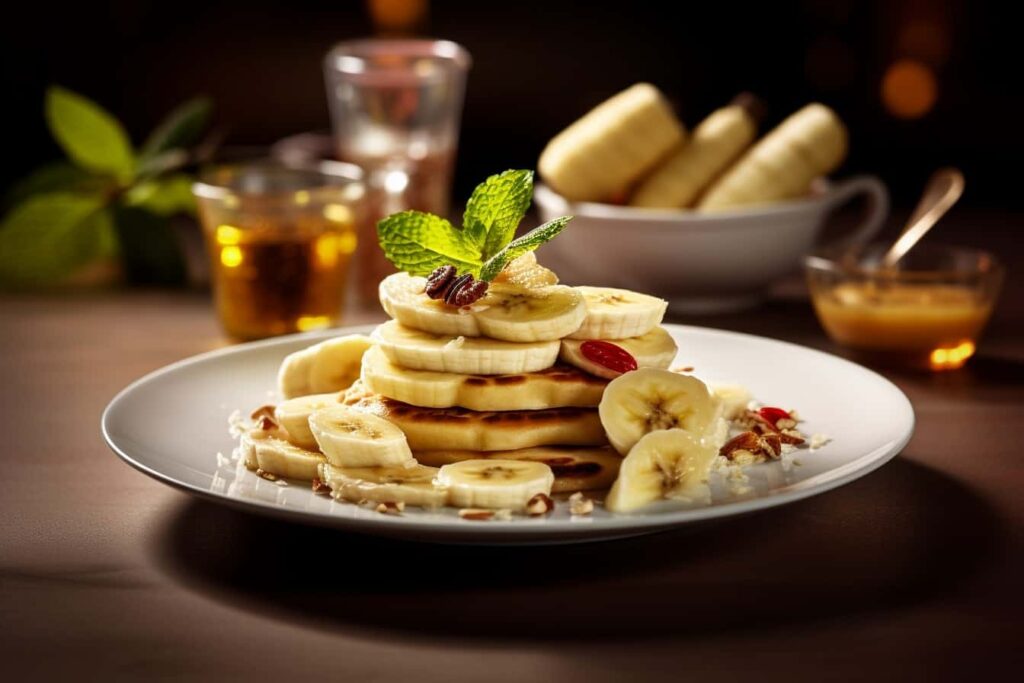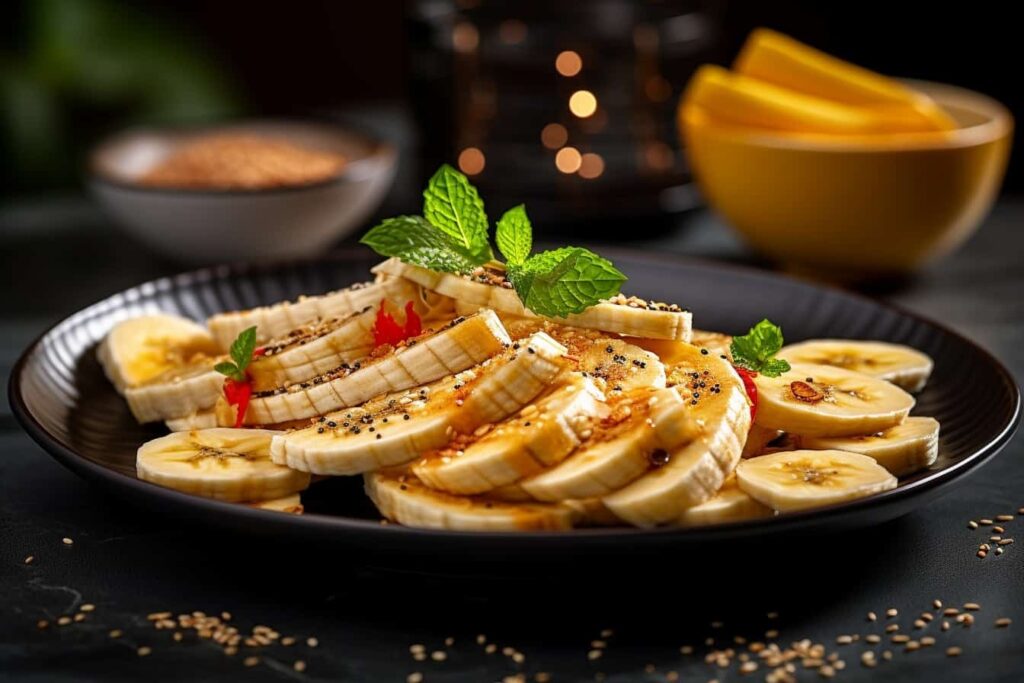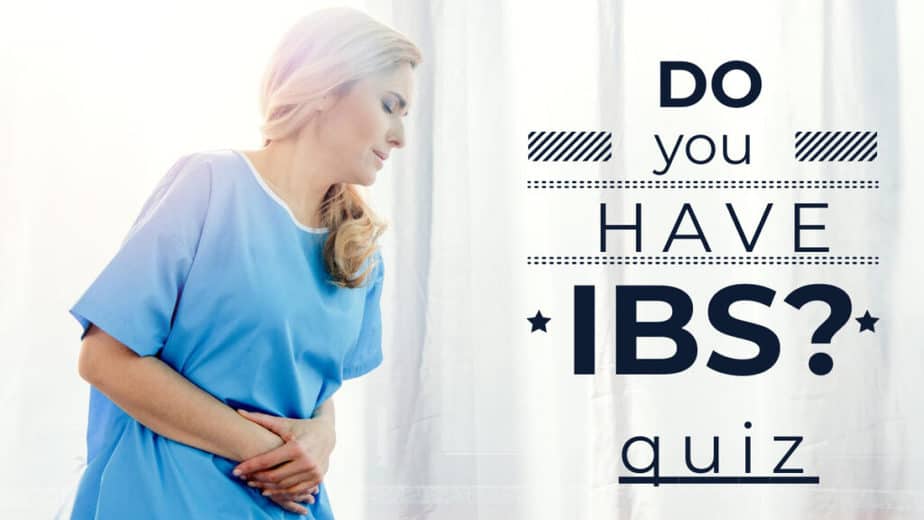Bananas, they’re a powerhouse of nutrients, but can they be a nemesis for those with Irritable Bowel Syndrome (IBS)? It’s a question that causes much debate and talk.
Rich in beneficial compounds yet potentially triggering for some, it’s time we peel back the layers on this controversy.
You might think that when dealing with IBS, it’s best to stay away from fruits. But did you know that bananas can actually help manage this condition?
As someone who knows all too well the struggles of dealing with IBS, I’ve realized that it’s not always about avoiding food groups—it’s about recognizing which ones can help.
So join me as we delve into the complex relationship between bananas and IBS – your journey to informed dietary choices starts here!
- Related article: Is Fruit Good for IBS?
Key Takeaways
- Bananas contain resistant starch and pectins, which support gut health.
- Regular consumption of bananas may improve heart and digestive health.
- Bananas are a good source of potassium, vitamin B6, and vitamin C, which promote heart health.
- Some studies suggest that bananas may be a risk factor for constipation.

Understanding the Food and IBS Relationship
It’s crucial to understand how certain foods, like bananas, can impact those with IBS, given their high fiber content and potential influence on gut health.
As an antioxidant-rich fruit, bananas contain vitamins, minerals, and plant compounds that promote overall health. However, they also have a high starch content which can affect bowel movements.
The relationship between food and IBS is complex. Some people find relief from IBS symptoms by including bananas in their diet due to the pectin which aids in normalizing bowel function. But others may experience discomfort because of the resistant starch present in unripe bananas.
So it’s essential for each individual to monitor their body’s response closely when incorporating new foods into their diets for managing IBS symptoms.
What are Bananas?
You’re probably familiar with them as a popular fruit, but did you know they’re also a great source of essential nutrients like potassium, vitamin B6, and vitamin C? Yes, I’m talking about bananas.
They are packed full of these important vitamins and minerals which help maintain heart health and regulate blood pressure. Bananas even contain dopamine that acts as an antioxidant in the body.
But it’s not just about what’s inside this yellow-skinned fruit. Even its peel has antiseptic and anti-inflammatory properties. Traditionally used in folk medicine, banana peels can promote wound healing and soothe bug bites or minor burns.
So next time you peel a banana, remember it’s more than just a tasty snack; it’s a powerhouse of health benefits!
What is the Nutritional Value of Bananas?
When considering the nutritional value of this yellow fruit, you’ll find that each medium-sized banana packs quite a punch. Here’s a breakdown in a convenient table format:
| Nutrient | Quantity | Daily Value (%) |
|---|---|---|
| Calories | 89 | – |
| Protein | 1.1g | 2% |
| Carbs | 22.8g | 8% |
| Fiber | 2.6g | 10% |
Bananas are rich in potassium, providing around 9% of your daily needs. They also serve as an excellent source of Vitamin B6 and Vitamin C, accounting for approximately one-third and over ten percent of your daily requirements respectively.
The presence of beneficial plant compounds like dopamine and catechins adds to its health benefits! So, if you’re thinking about adding bananas to your diet, it’s certainly a nutritious choice!

Are Bananas High or Low-FODMAP?
If you’re considering the FODMAP content of your IBS diet, you’ll find that ripe bananas are high in FODMAPs while unripe ones are low.
This means if you’re managing IBS symptoms through a low-FODMAP diet, it’s beneficial to opt for those less mature, green bananas.
Why? Because they contain fewer fermentable carbs that can exacerbate digestive issues. As they ripen and turn yellow or brown, the starch converts into sugars making them higher in FODMAPs.
Just remember to keep your portions moderate as even low-FODMAP foods can cause distress if consumed excessively. It’s all about balance and finding what works best for your individual body needs – after all, we’re here to serve each other with knowledge and compassion on this journey towards health.
Here’s a quick guide to help you remember:
| Ripeness | FODMAP levels |
|---|---|
| Unripe or Green | Low-FODMAP |
| Yellow or Spotted | High-FODMAP |
Bananas and IBS: An In-Depth Look
Let’s take a deeper look at the relationship between bananas and IBS.
We’ll be exploring various aspects such as the impact of bananas on IBS symptoms, whether they can aid with IBS-induced constipation or diarrhea, and their role during an IBS flare-up.
The Impact of Bananas on IBS Symptoms
Bananas, being rich in fiber and pectin, can potentially help regulate digestive processes and alleviate some IBS symptoms. However, as someone with an interest in health and wellness, it’s important to remember everyone’s body is different.
Here are a few things to keep in mind:
- Unripe bananas contain resistant starch which can exacerbate IBS symptoms.
- Ripe bananas have less of this starch and could be better tolerated.
- Bananas are high in soluble fiber which aids digestion but should be eaten moderately.
- The potassium content may help with fluid balance in the gut.
- Always consult your healthcare professional for personalized advice.
Remember, managing IBS often involves a holistic approach including diet modifications, stress management techniques, and sometimes medication.

Are Bananas Good for IBS Constipation?
It’s important to note that the effect of bananas on constipation can vary depending on their ripeness. Unripe bananas contain high amounts of resistant starch which can potentially aggravate IBS symptoms, including constipation.
On the other hand, ripe bananas have less resistant starch and more soluble fiber, which could help improve bowel movements. However, some studies suggest overconsumption of well-ripened bananas might lead to constipation.
While bananas have various health benefits and are generally safe to consume for those with IBS, it’s essential to monitor your body’s response and adjust intake accordingly.
Now, let’s shift our focus to whether these yellow fruits can help manage loose stools often associated with your gut condition.
Are Bananas Good for IBS Diarrhea?
The pectin content in bananas, which increases as they ripen, is a type of soluble fiber that helps absorb water in the intestines. This can slow down digestion and potentially reduce diarrhea.
Bananas are part of the BRAT (Bananas, Rice, Applesauce, Toast) diet often recommended for diarrhea relief due to their bland nature and ability to firm up bowel movements.
However, everyone’s IBS symptoms vary and what works well for some may not work for others. It’s essential to monitor how different foods affect your IBS symptoms personally.
Always consult with a healthcare provider before making any significant changes to your diet.
The Role of Bananas during an IBS Flare-Up
During an IBS flare-up, will adding certain fruits help? From my experience, bananas can play a significant role during an IBS episode.
Given their soluble fiber content, they can help regulate digestion and reduce symptoms like diarrhea.
On top of that, bananas are rich in potassium which is essential for maintaining fluid balance in the body – particularly useful if dehydration occurs after frequent bowel movements.
Plus, they contain pectin and resistant starch that may aid gut health by promoting beneficial gut bacteria. Nevertheless, remember to eat them when ripe as unripe bananas could potentially worsen symptoms.
Are Ripe or Unripe Bananas Better for IBS?
Ripe bananas may be a better choice than their unripe counterparts for a number of reasons:
- Ripe bananas have less resistant starch, which can cause gas and bloating in some people with IBS.
- The sugar content in ripe bananas is more readily absorbed by the body, reducing the chance of fermentation in the gut that could lead to discomfort.
- Ripe bananas are easier to digest due to their soft texture and high water content.
They also contain higher levels of antioxidants like dopamine and catechins that promote overall health.
While everyone’s body responds differently, most people with IBS might find consuming ripe bananas more beneficial for their condition.
How to Choose Good Bananas for IBS
You should look for bananas that are just ripe or slightly underripe if you’re dealing with IBS. The greener the banana, the higher its resistant starch content. This type of fiber helps manage your bowel function and can potentially alleviate IBS symptoms.
As bananas ripen, their starch content converts to sugars, which might not be beneficial for some individuals with IBS. It’s also essential to remember that everyone’s response to bananas can vary due to the individual nature of IBS. Monitoring your body’s reaction after consuming them will help determine what works best for you.
So next time you pick up a banana, go for one that is less ripe to aid in managing your IBS symptoms better.
To make sure you make the perfect choice, here’s a table of the key considerations:
- Ripeness: Brown spots
- Nutritional Content: Resistant starch
- Organic Vs. Conventional: Pesticide residue
- Varieties: Cavendish, red, baby
- Storage: Avoid over-ripening
Banana Guidelines for IBS sufferers
Let’s dive into the role bananas play in an IBS diet – when and how to include them, and whether or not you should avoid banana bread.
We’ll also touch on some potential side effects and precautions associated with bananas that IBS sufferers need to be aware of.
When and How to Include Bananas in an IBS Diet
Considering their high pectin content, bananas can be a beneficial addition to an IBS diet. This water-soluble fiber helps improve digestion and soothe the gut. The resistant starch in unripe bananas also promotes gut health by acting as a prebiotic, feeding beneficial bacteria.
However, it’s crucial to know when and how to include them in your diet. As bananas ripen, the starch turns into sugars which may trigger IBS symptoms.
It’s best to consume them while they’re still somewhat green to take advantage of the resistant starch without getting too much sugar.
Also, try not to eat more than one banana a day and always incorporate them into a balanced meal with other fiber-rich foods for best results.
- Learn more about Fiber and IBS Guidelines

Should You Avoid Banana Bread with IBS?
While it’s tempting to reach for a slice of banana bread, it may not be the best choice for IBS sufferers.
Despite bananas being considered a safe food for IBS due to their soluble fiber content, banana bread is often made with other ingredients that can trigger IBS symptoms.
For instance, wheat flour used in most recipes is high in insoluble fiber which can exacerbate symptoms. The sugar and fats that are also added into the mix could cause further discomfort.
Remember, managing IBS often involves identifying and avoiding personal triggers.
If you’ve noticed worsened symptoms after eating banana bread, it might be wise to avoid it or consider an alternative recipe using gut-friendly ingredients like gluten-free flour and minimal added sugars.
Learn more about Gluten Free Food for IBS.
Potential Side Effects and Precautions with Bananas
You might love their taste, but it’s also important to be aware of potential side effects and precautions when consuming bananas.
Though bananas are generally safe and healthy, they can have mixed effects on people with IBS. Some find that unripe bananas trigger symptoms due to high starch content, while others benefit from the soluble fiber in ripe ones.
Also, overconsumption may lead to excess potassium intake which could affect heart health. Moreover, folks with type 2 diabetes should monitor banana consumption as ripened ones can impact blood sugar levels.
It’s crucial to listen to your body and possibly consult a healthcare professional if you’re unsure how bananas affect your IBS or overall health.
To learn more about other foods and IBS, check out these articles:
Bananas and IBS Frequently Asked Questions
Do unripe bananas have the same effect on IBS as ripe bananas?
Painting a vivid picture, green or unripe bananas can affect IBS differently than ripe ones. They contain more resistant starch, which can be harder to digest and may exacerbate IBS symptoms for some people.
Are there any specific banana varieties that are better for IBS sufferers?
There’s no specific variety of bananas proven to be better for IBS sufferers. However, some people find unripe, green bananas easier to digest due to their higher resistant starch content versus ripe ones.
How does the cooking or preparation method of bananas affect their impact on IBS?
Cooking bananas, like baking or boiling, can increase their digestibility and decrease potential IBS symptoms. However, overripe bananas may contain more sugars, which could exacerbate IBS in some individuals. Always monitor your body’s response.
Are there any risks associated with eating bananas for people with IBS?
While bananas provide essential nutrients, they may pose risks for people with IBS. High intake of ripe bananas can affect blood sugar levels. Also, some studies suggest that they could contribute to constipation.
Can bananas be included in a diet plan for managing IBS symptoms?
Yes, bananas can be included in an IBS management diet. They are rich in soluble fiber which aids digestion and can help manage symptoms. However, individual responses vary so monitor your body’s reaction closely.


